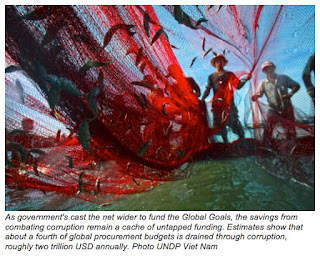Why combating corruption in government contracts is key to funding the Sustainable Development Goals
01 Mar 2017 by Elodie Beth, Bangkok Regional Hub
A bridge collapses because of poor construction. Pupils in an elementary school lose a month or two of classes because their books aren’t ready. A young woman dies after she receives a vaccine for a common influenza.
These are not uncommon headlines in the news.
But they often contain a common underlying thread: corruption and nepotism in government contracts leads the state to buy sub-standard goods and services. Estimates show that about a fourth of the procurement budget is drained through corruption, which is around 2 trillion USD annually (OECD, 2013).
These cases illustrate how the failure of governments to timely and effectively deliver public services such as infrastructure, education and health, affects the lives of millions every day. These basic services are at the very core of the Sustainable Development Goals that governments across the world have committed to.
Despite efforts to introduce laws in recent decades and make governments more accountable through reforms, public procurement has often been overlooked by governments as a critical cog that deserves attention.
And, procurement is big money. The funds spent by governments on buying goods, services and infrastructure such as roads, hospitals or school books accounts for about 20% of the gross domestic product in countries in South East Asia (WB, 2015). Globally around US$9.5 trillion of public money is spent each year by governments procuring goods and services for people (de Swardt, 2015).
Considering the sums of money at stake, this represents a huge potential for governments to manage their domestic resources more efficiently.
As the world looks for new ways to finance the ambitious Sustainable Development Goals, combating corruption in public procurement may trigger a virtuous cycle of ensuring higher quality public services and infrastructure that is built to last longer, as well as savings that can finance new development projects that bring us closer to the goals.
There are other gains at stake as well.
Public procurement affects a substantial share of world trade flows, amounting to €1,000 billion per year. In the Asia Pacific region, over half of all preferential trade agreements include measures targeting government procurement. Combating such corruption offers smoother regional integration within the newly created ASEAN Economic Community.
UNDP is working with governments in the region in a new effort to promote sound public procurement within the ASEAN community. Our work with the Thai government over the last three years, which was supported by the UK Foreign Commonwealth Office, is already seeing some tangible results. The Thai government legislated its first-ever Public Procurement Act in December 2016. Integrity Pacts were introduced to set high integrity standards for both public and private sectors alike. In addition people in Thailand are now acting as independent observers in big infrastructure development to monitor the integrity of the projects and report in case there are irregularities.
Building on this success in Thailand we are planning to replicate this approach in other ASEAN countries. Governments will benefit from UNDP’s new guidebook to mitigate risks in public procurement as well as our long-standing experience with capacity-building of procurement officials with the internationally accredited UNDP/CIPS procurement curriculum.
It is time for governments to recognize that procurement is not just a process, but a key instrument in a nation’s development strategy, especially in the context of the world we want, free of poverty and inequalities by 2030.
Elodie Beth is a Regional Governance Advisor at UNDP's Bangkok Regional Hub. She advises governments, national partners and UNDP country offices in the region on their efforts to fight corruption and promote transparency and accountability.
